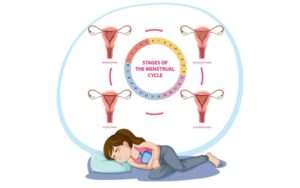How Can I Get My Period Immediately for PCOD?
Introduction
Polycystic Ovarian Disease (PCOD) is a prevalent hormonal disorder that impacts many women of reproductive age. One of the most challenging symptoms of PCOD is irregular or absent menstrual periods. This blog will explore various methods for PCOD problem treatment to induce a period immediately, drawing insights from Dr. Yasmin Imdad of Mom & More Clinic.
Understanding PCOD
PCOD, also known as Polycystic Ovary Syndrome (PCOS), is characterized by multiple cysts on the ovaries due to their inability to release eggs regularly. This hormonal imbalance can lead to symptoms like irregular periods, weight gain, acne, and excessive hair growth.
Symptoms of PCOD
- Irregular Periods: A common symptom where women with PCOD often experience infrequent, irregular, or prolonged menstrual cycles.
- Excess Androgen: Elevated levels of male hormones can cause excess facial and body hair (hirsutism), severe acne, and male-pattern baldness.
- Polycystic Ovaries: Enlarged ovaries with numerous small cysts visible on an ultrasound.
- Weight Gain: Many women with PCOD struggle with significant weight gain or difficulty losing weight.
- Thinning Hair: Hair thinning or loss on the scalp.
- Darkening of Skin: Dark patches around the neck, groin, and under the breasts.
- Skin Tags: Small flaps of excess skin in areas such as the armpits or neck.

Causes of PCOD
The exact cause of PCOD is not well understood, but factors believed to contribute include:
- Genetics: A genetic link is suggested as PCOD often runs in families.
- Insulin Resistance: Many women with PCOD experience insulin resistance, leading to higher insulin levels that can increase androgen production and disrupt ovulation.
- Inflammation: Low-grade inflammation may stimulate the ovaries to produce androgens.
- Hormonal Imbalance: Elevated androgen levels can prevent the ovaries from releasing an egg, resulting in irregular periods.
Medical Approaches to PCOD Problem Treatment
To address menstrual irregularities in PCOD, several medical treatments can be effective:
Birth Control Pills
These contain hormones that regulate the menstrual cycle by balancing estrogen and progesterone levels. According to Dr. Yasmin Imdad of Mom & More Clinic, “Birth control pills are an effective PCOD problem treatment, helping to induce regular periods and alleviate other symptoms.
Progestin Therapy
Progestin, a synthetic form of progesterone, is used for 10-14 days each month to induce a period by shedding the uterine lining. Dr. Imdad notes, “Progestin therapy is useful for women who do not respond well to birth control pills.”
Metformin
Originally for type 2 diabetes, Metformin helps improve insulin resistance, reducing androgen levels and promoting ovulation. Dr. Imdad explains, “Metformin is particularly beneficial for women with insulin resistance and PCOD.”
Clomiphene Citrate (Clomid)
This ovulation induction medication stimulates the ovaries to release eggs and is often used for women with PCOD trying to conceive. “Clomid is a common first-line treatment for women with PCOD aiming for pregnancy,” says Dr. Imdad.
Gonadotropins
Injectable hormones that stimulate the ovaries to produce eggs, used when other treatments are ineffective. Dr. Imdad advises, “Gonadotropins require careful monitoring to prevent multiple pregnancies.”

Lifestyle Changes and Natural Remedies
For managing PCOD and regulating menstrual cycles, adopting a healthy lifestyle is crucial. A balanced diet rich in fruits, vegetables, lean proteins, and whole grains can help maintain hormonal balance. Regular physical activity, including yoga and Pilates, can improve insulin sensitivity and reduce stress, essential for managing PCOD.
Certain natural supplements and herbal remedies, like cinnamon and turmeric, may also assist in regulating menstrual cycles. Research highlighted in the International Journal of Endocrinology Metabolism has shown these remedies’ potential benefits.
When to Seek Medical Help
While lifestyle changes and natural remedies can be effective, it’s important to seek professional medical intervention if symptoms are severe or if lifestyle modifications do not produce results. Dr. Yasmin Imdad of Mom & More Clinic emphasizes, “Each woman’s experience with PCOD is unique, and personalized treatment plans are essential for the best outcomes.”
Conclusion
Addressing menstrual irregularities with effective PCOD problem treatment is crucial for overall health and well-being. Consulting with healthcare professionals like Dr. Yasmin Imdad at Mom & More Clinic can provide the necessary guidance for effective management and treatment tailored to individual needs. For personalized advice and treatment, contact Dr. Yasmin Imdad at Mom & More Clinic. They offer comprehensive care for women with PCOD, ensuring that each patient receives the best possible treatment plan.